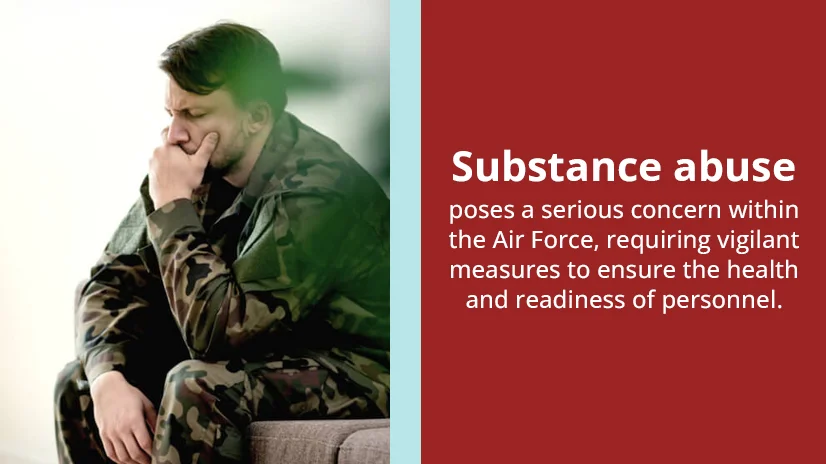
How Depression and Anxiety are Linked
Overcome depression and anxiety with personalized care at Indiana Center for Recovery. Find hope and healing today!

Substance abuse is a critical issue that affects various sectors of society, including the military. In the Air Force, substance abuse can have significant consequences, impacting not only the individual but also the unit’s overall effectiveness and readiness.
This article provides a comprehensive overview of substance abuse within the Air Force, including its causes, effects, and treatment options to address it.
Substance abuse in the Air Force is a serious issue affecting personnel’s health, readiness, and effectiveness. This article covers:
Veterans, including those from the Air Force, are encouraged to take the first step towards recovery by contacting Indiana Center for Recovery at (844) 650-0064 today.

Substance abuse in the Air Force, one of the branches of the military, refers to the misuse of drugs or alcohol by service members. It can negatively affect their health, job performance, and relationships. Substance abuse includes using drugs or alcohol in ways that are harmful or excessive.
Commonly abused substances in the Air Force include alcohol, prescription medications like painkillers and sedatives, and illegal drugs like marijuana, cocaine, and methamphetamine. These substances can impair judgment, coordination, and decision-making, posing severe risks to military operations and personnel safety.
Addressing substance abuse in the Air Force involves prevention, education, and treatment programs. Prevention efforts focus on promoting healthy behaviors and providing information about the risks of substance abuse. Education programs aim to increase awareness and encourage people to seek help if they have a problem.
Treatment programs offer support and resources for those struggling with drug and alcohol abuse. This may include evidence-based practices like counseling, medications, and rehab services. Additionally, the Air Force has policies in place to identify and intervene when substance abuse is suspected, including drug testing and disciplinary action when necessary.
Substance abuse in the Air Force, like other military branches, is influenced by different factors that can contribute to the misuse of alcohol and drugs among service members. Let’s explore them:
The demanding nature of Air Force duties, including high-stress environments and intense operational demands, can contribute to substance abuse among active duty service members. Coping with the pressures of military life can lead individuals to turn to substances as a means of escape or relief.
Frequent deployments and exposure to combat situations can increase the likelihood of substance abuse among Air Force personnel. The unique challenges and traumas associated with deployment can exacerbate existing mental health issues and drive individuals to seek solace in substance use.
The nature of military service often involves prolonged periods of separation from family members and loved ones. Feelings of loneliness, isolation, and homesickness can be significant stressors that contribute to substance abuse as individuals attempt to cope with feelings of alienation.
Mental health problems, such as depression, anxiety, and post-traumatic stress disorder (PTSD), are prevalent among Air Force personnel and can contribute to substance abuse. Self-medication with alcohol or drugs may be used as a means of managing symptoms or numbing emotional pain.
The accessibility of alcohol and, in some cases, drugs within the military environment can facilitate substance abuse. Easy access to alcohol on bases and during social events, coupled with the availability of prescription medications, leads to a higher risk of misuse among service members.
Peer pressure and cultural norms within the military can also influence substance abuse behaviors. The normalization of binge drinking and the perception that alcohol use is a part of military culture can contribute to a cycle of substance abuse, particularly among younger service members.
Addressing these contributing factors requires comprehensive prevention and intervention efforts adapted to the unique needs of military personnel.
Substance abuse among Air Force personnel can have wide-ranging and severe consequences. Let’s have a closer look at these impacts:
Drug and alcohol abuse poses significant risks to health, including physical and mental health problems. Chronic alcohol misuse, for example, can lead to liver disease, heart conditions, and cognitive impairment. Illicit drug use can result in addiction, overdose, and other serious health complications.
Substance abuse can impair cognitive function, motor skills, and decision-making abilities, all of which are essential for performing duties effectively. Impaired duty performance due to substance abuse can compromise mission readiness and jeopardize the safety of personnel and mission outcomes.
Substance abuse introduces safety and operational risks within the Air Force, particularly in high-risk environments such as flight operations. Impaired judgment and decision-making can lead to accidents, injuries, and fatalities, endangering both personnel and mission assets.
Engaging in substance abuse can result in serious legal and disciplinary issues. Air Force personnel may face court-martial, dishonorable discharge, or other severe penalties. These consequences not only affect the individual’s military career but also their future opportunities and reputation.
Substance abuse can lead to strained relationships with family members, friends, and colleagues. It can lead to conflict, mistrust, and isolation. The resulting emotional and social stress can further exacerbate substance use, creating a vicious cycle that affects both the individual and their loved ones.
Substance abuse often results in significant financial strain. The costs of purchasing drugs or alcohol, combined with potential legal fees and healthcare expenses, can quickly add up. Additionally, impaired performance can lead to loss of income and career advancement opportunities.
Addressing this issue demands a comprehensive program that prioritizes prevention, intervention, and support services for affected individuals.
When addressing substance abuse among Air Force personnel, a variety of treatment and rehabilitation options are available, including:
Medical detoxification, or medical detox, is often the first step in the treatment of substance misuse and addiction. Under medical supervision, individuals undergo withdrawal in a safe and controlled environment, minimizing discomfort and health risks associated with cessation of substance use.
Behavioral therapies, such as cognitive behavioral therapy (CBT) and dialectical behavior therapy (DBT), help identify and alter unhealthy patterns of thinking and behavior related to drug use. These therapies equip Air Force personnel with coping skills and strategies to manage triggers and cravings, fostering lasting recovery.
Medication-assisted treatment (MAT) combines FDA-approved medications with behavioral therapies to address substance use disorders effectively. Medications such as buprenorphine, methadone, and naltrexone can help lessen cravings and withdrawal symptoms, supporting long-term recovery.
Many Air Force personnel struggling with substance abuse also have co-occurring mental illnesses, known as dual diagnosis. Dual-diagnosis treatment addresses both addiction and underlying mental health disorders concurrently, ensuring a comprehensive approach to care and improved treatment outcomes.
Family therapy involves the involvement of family members in the treatment process to address interpersonal dynamics, communication patterns, and family roles that may contribute to substance abuse. Involving family members can provide additional support and promote long-term recovery.
Support groups, such as Alcoholics Anonymous (AA) and Narcotics Anonymous (NA), provide Air Force personnel with peer support and inspiration throughout their recovery journey. These groups offer a safe space to share experiences, receive guidance, and maintain accountability.
Aftercare and relapse prevention programs help Air Force personnel transition back into their daily lives after completing formal treatment. These programs provide ongoing support, counseling, and resources to avoid relapse and maintain sobriety over the long term.
By accessing these resources and support services, individuals grappling with drug and alcohol use disorder (AUD) can embark on a journey of healing and reclaiming their lives.
In most cases, military services have strict rules against drug use. If you’ve done drugs, it could disqualify you from joining. However, some branches might consider past drug use on a case-by-case basis. It’s crucial to be honest during the recruitment process. Lying about drug use can have serious consequences.
If you’re genuinely committed to serving, consider discussing your situation with a recruiter. They can provide accurate information and guide you on your options. Remember, integrity is fundamental in military service, so it’s best to approach the situation with honesty and openness.
Air Force members facing substance abuse can seek help through various resources. The Air Force offers support programs like the Substance Use Disorder Clinical Care Program. This program provides confidential counseling and treatment services for those struggling with substance abuse.
Additionally, members can access resources such as Alcohol and Drug Abuse Prevention and Treatment or ADAPT programs, which offer education, counseling, and rehab services. Seeking help early is vital, and the Air Force encourages members to reach out to their unit leadership or healthcare providers for assistance.
The Air Force takes proactive steps to prevent substance abuse among its military members. They provide education and training on the risks associated with drug and alcohol misuse. Regular drug testing is conducted to deter and detect substance abuse.
Additionally, leaders promote a culture of health and well-being, encouraging healthy lifestyle choices and offering support services for those struggling. The Air Force also implements strict policies and consequences for violating substance abuse rules, aiming to deter such behavior.
At Indiana Center for Recovery, we stand ready to support veterans, including those from the Air Force, in reclaiming their lives from substance abuse-related issues.
Our tailored veterans’ treatment program kicks off with compassionate medical detox, ensuring a safe and comfortable journey as substances leave your system. From there, it’s all about personalized residential treatment, where you’ll find a blend of medical care, behavioral therapies, and family programs.
But we don’t stop there. Once residential treatment wraps up, our outpatient program keeps you on track, whether you’re heading home or opting for our supportive sober housing community.
Take the first step towards a drug-free life today. Contact us at (844) 650-0064, and let us help you reclaim your future of wellness.